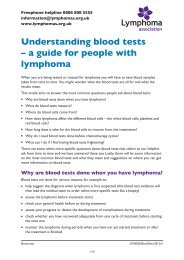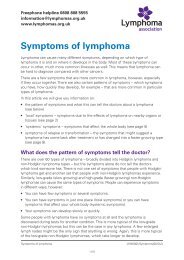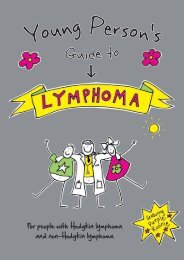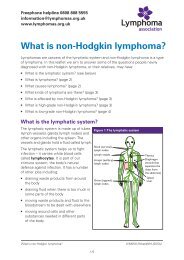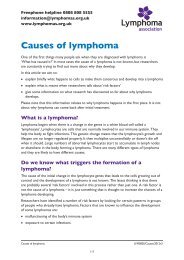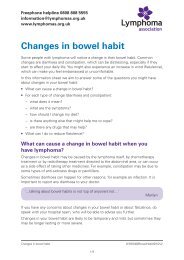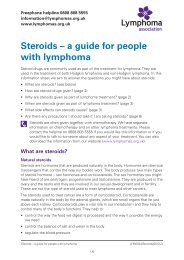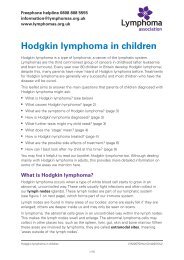What happens if Hodgkin lymphoma comes back?
What happens if Hodgkin lymphoma comes back?
What happens if Hodgkin lymphoma comes back?
You also want an ePaper? Increase the reach of your titles
YUMPU automatically turns print PDFs into web optimized ePapers that Google loves.
to happen within 2 years of the end of your first course of treatment – the nodularlymphocyte-predominant type of <strong>Hodgkin</strong> <strong>lymphoma</strong> is more likely to come <strong>back</strong> laterthan this. The <strong>lymphoma</strong> might come <strong>back</strong> where it was before or it can affect anotherpart of your body.Relapsed <strong>Hodgkin</strong> <strong>lymphoma</strong> can be treated again. The treatments often work verywell and it may still be possible for you to be cured.<strong>What</strong> does it mean <strong>if</strong> <strong>Hodgkin</strong> <strong>lymphoma</strong> does notrespond well to treatment?A small number of people with <strong>Hodgkin</strong> <strong>lymphoma</strong> will not respond well to their firsttreatment. Lymphoma that does not go into remission with treatment is known asrefractory <strong>lymphoma</strong>.If your initial treatment has not worked as well as hoped, other treatments maywork better and it may still be possible for you to be cured. The treatments given forrelapsed <strong>Hodgkin</strong> <strong>lymphoma</strong> can often be used for refractory <strong>Hodgkin</strong> <strong>lymphoma</strong> too(see pages 3–5).<strong>What</strong> will happen next?If your <strong>lymphoma</strong> relapses or is refractory, your specialist will want to repeat some ofthe tests you had to start with. These may include blood tests, scans and possibly abiopsy. Your further treatment will depend on:• your symptoms and your test results• your general health and fitness• the treatment you had before and how well your <strong>lymphoma</strong> responded to it• how well you coped with the treatment• how long it is since you were treated (<strong>if</strong> your <strong>lymphoma</strong> has relapsed).Your treatment will be discussed by several expert doctors and nurse specialists at themultidisciplinary team (MDT) meeting. Do let your team know <strong>if</strong> you have any strongviews about your treatment. When your doctor recommends a treatment for you, donot be afraid to ask why they feel it is the best treatment for you.Your feelings <strong>if</strong> the <strong>lymphoma</strong> hasn’t gone away or hascome <strong>back</strong> againMost people being treated for <strong>Hodgkin</strong> <strong>lymphoma</strong> will hope that the treatment isgoing to cure them. It is therefore likely to be very disappointing and upsetting to betold that your <strong>lymphoma</strong> has not responded to the treatment or that it has come <strong>back</strong>.Everyone will have slightly d<strong>if</strong>ferent feelings when they hear this news. For manypeople it brings <strong>back</strong> the whole range of emotions they felt when they were firstdiagnosed. These emotions are no easier to cope with second time round, even <strong>if</strong> thedoctors feel a cure is possible with further treatment and start to plan this with you.<strong>What</strong> <strong>happens</strong> <strong>if</strong> <strong>Hodgkin</strong> <strong>lymphoma</strong> <strong>comes</strong> <strong>back</strong>?LYM0113/HodgLRelapse/2014v32/7
High-dose chemotherapy and stem cell transplantIf your <strong>lymphoma</strong> has been controlled by more chemotherapy and you are fit enough,you may be offered high-dose chemotherapy and a stem cell transplant. This form oftreatment takes several weeks to complete, and for some of that time you will needto stay in hospital.Stem cells are special cells from the bone marrow that can make normal blood cells.A stem cell transplant allows very high doses of anti-<strong>lymphoma</strong> therapy to be given toyou. It works by replacing the bone marrow damaged by this treatment with healthystem cells. A bigger dose of chemotherapy can often work when standard first-linetreatments have not been enough.When you have a stem cell transplant, you first have high doses of chemotherapy (andsometimes also radiotherapy). This treatment causes so much damage to your bonemarrow that it might never recover by itself. Instead it is ‘rescued’ (helped to recover)by the stem cells that are transplanted into you. The stem cells are put <strong>back</strong> intoyour bloodstream, just like a blood transfusion. They then settle in your bone marrowwhere they start to grow and make new blood cells.Stem cell transplants for <strong>Hodgkin</strong> <strong>lymphoma</strong> are usually autologous. This means thatthe stem cells used are your own. They are collected, usually after one of your cyclesof chemotherapy, and kept frozen until they are needed. Less often, stem cells from adonor are used – this is known as an allogeneic or 'donor' transplant. Most allogeneicstem cell transplants for <strong>lymphoma</strong> now use reduced-intensity conditioning (this issometimes shortened to RIC or known as a ‘mini-transplant’). It means less treatmentis given before the transplant. Although this makes the treatment safer than otherallogeneic transplants, it is still not suitable for everyone.Stem cell transplants carry lots of risks as well as benefits, especially <strong>if</strong> they areallogeneic. If your doctors are thinking about this form of treatment for you, they willtalk to you in detail about it.If your <strong>Hodgkin</strong> <strong>lymphoma</strong> relapses after an autologous stem cell transplant, youmight be treated with an allogeneic stem cell transplant or with the new drugbrentuximab vedotin (see below).Please ring our helpline (0808 808 5555) <strong>if</strong> you want to talk to someone aboutstem cell transplants. We also have information about transplants that thehelpline can send you. The information can also be downloaded from our website(www.<strong>lymphoma</strong>s.org.uk).BrentuximabRecently a new treatment has been shown to work well in people with relapsed orrefractory <strong>Hodgkin</strong> <strong>lymphoma</strong>. Brentuximab vedotin (Adcetris ® ) is licensed for use inpeople with <strong>Hodgkin</strong> <strong>lymphoma</strong> who have relapsed after a stem cell transplant or inpeople who are not able to have a stem cell transplant and have had at least two othertypes of treatment. At the time of writing, doctors in England can obtain funding forbrentuximab from the National Cancer Drugs Fund. Currently, there are no similar fundsin the rest of the UK, where funding must be sought on an individual basis.<strong>What</strong> <strong>happens</strong> <strong>if</strong> <strong>Hodgkin</strong> <strong>lymphoma</strong> <strong>comes</strong> <strong>back</strong>?LYM0113/HodgLRelapse/2014v34/7
Talking about any concerns you may have is more important than ever at this time.You may be able to talk to your clinical nurse specialist or GP. Some people find thatcounselling is helpful. Our helpline staff are always happy to listen too and may beable to put you in touch with a ‘buddy’ – someone who has been through the samesort of treatment as you.Please ring our helpline (0808 808 5555) <strong>if</strong> you would like to talk to someoneabout how you are feeling about your <strong>lymphoma</strong> or <strong>if</strong> you would like to be put intouch with a Lymphoma Association buddy.Other possible sources of helpMaggie’s CentresDrop-in centres offer free, comprehensive support for anyone affected by cancer (alsoonline). 0300 123 1801 enquiries@maggiescentres.orgwww.maggiescentres.orgBritish Association for Counselling and PsychotherapyProvides a register of accredited counsellors throughout the UK. 01455 883300 bacp@bacp.co.ukwww.bacp.co.ukMacmillan Cancer SupportProvides practical, medical, emotional and financial support to people living with cancer. 0808 808 0000 (Monday–Friday, 9am–8pm)www.macmillan.org.ukAcknowledgementWe would like to thank Dr Graham Collins, consultant haematologist at OxfordUniversity Hospitals NHS Trust, for his help in reviewing this information sheet. Wealso wish to thank all those people affected by <strong>lymphoma</strong> who have helped us todevelop our information.Selected referencesThe full list of references is available on request. Please contact us via email(publications@<strong>lymphoma</strong>s.org.uk) or telephone 01296 619409 <strong>if</strong> you would like a copy.Collins GP, et al. Guideline on the management of primary resistant and relapsedclassical <strong>Hodgkin</strong> <strong>lymphoma</strong>. British Journal of Hematology, 2013. Epub ahead of print1 October 2013. DOI: 10.1111/bjh.12582.van den Neste E, et al. Classical <strong>Hodgkin</strong>'s <strong>lymphoma</strong>: the Lymphoma StudyAssociation guidelines for relapsed and refractory adult patients eligible for transplant.Haematologica, 2013. 98: 1185–1195.<strong>What</strong> <strong>happens</strong> <strong>if</strong> <strong>Hodgkin</strong> <strong>lymphoma</strong> <strong>comes</strong> <strong>back</strong>?LYM0113/HodgLRelapse/2014v36/7
Colpo A, et al. Current status of autologous stem cell transplantation in relapsed andrefractory <strong>Hodgkin</strong>'s <strong>lymphoma</strong>. Oncologist, 2012. 17: 80–90.Rothe A, et al. Brentuximab vedotin for relapsed or refractory CD30+ hematologicmalignancies: the German <strong>Hodgkin</strong> Study Group experience. Blood, 2012. 120: 1470–1472.Kuruvilla J, et al. How I treat relapsed and refractory <strong>Hodgkin</strong> <strong>lymphoma</strong>. Blood, 2011.117: 4208–4217.How we can help youWe provide:● a Freephone helpline providing information and emotional support 0808 808 5555(9am–6pm Mondays–Thursdays; 9am–5pm Fridays) or information@<strong>lymphoma</strong>s.org.uk● booklets and other information about <strong>lymphoma</strong> (free of charge)● a website with forums – www.<strong>lymphoma</strong>s.org.uk● the opportunity to be put in touch with others affected by <strong>lymphoma</strong> through ourbuddy scheme● a nationwide network of <strong>lymphoma</strong> support groups.How you can help usWe continually strive to improve our information resources for people affected by<strong>lymphoma</strong> and we would be interested in any feed<strong>back</strong> you might have. Please visitwww.<strong>lymphoma</strong>s.org.uk/feed<strong>back</strong> or email publications@<strong>lymphoma</strong>s.org.uk <strong>if</strong> youhave any comments. Alternatively please phone our helpline on 0808 808 5555.We make every effort to ensure that the information we provide is accurate but it shouldnot be relied upon to reflect the current state of medical research, which is constantlychanging. If you are concerned about your health, you should consult your doctor.The Lymphoma Association cannot accept liability for any loss or damage resulting fromany inaccuracy in this information or third party information such as information onwebsites which we link to. Please see our website (www.<strong>lymphoma</strong>s.org.uk) for moreinformation about how we produce our information.© Lymphoma AssociationPO Box 386, Aylesbury, Bucks, HP20 2GARegistered charity no. 1068395Produced: February 2014Next planned review: 2016<strong>What</strong> <strong>happens</strong> <strong>if</strong> <strong>Hodgkin</strong> <strong>lymphoma</strong> <strong>comes</strong> <strong>back</strong>?LYM0113/HodgLRelapse/2014v37/7



